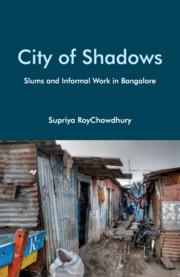Book contents
- Frontmatter
- Contents
- List of Tables
- Acknowledgements
- 1 Introduction
- 2 Welfare and Work: State Autonomy Revisited
- 3 Urban Poverty and Informal Work
- 4 A Political Economy Overview: Karnataka and Bangalore
- 5 New Slums: Migration, Livelihoods and Living
- 6 Old Slums
- 7 Impact of Slum Housing Policies: Bangalore’s New Ghettoes
- 8 Women Workers in Bangalore’s Garment Export Companies
- 9 Conclusion
- Index
5 - New Slums: Migration, Livelihoods and Living
Published online by Cambridge University Press: 31 July 2021
- Frontmatter
- Contents
- List of Tables
- Acknowledgements
- 1 Introduction
- 2 Welfare and Work: State Autonomy Revisited
- 3 Urban Poverty and Informal Work
- 4 A Political Economy Overview: Karnataka and Bangalore
- 5 New Slums: Migration, Livelihoods and Living
- 6 Old Slums
- 7 Impact of Slum Housing Policies: Bangalore’s New Ghettoes
- 8 Women Workers in Bangalore’s Garment Export Companies
- 9 Conclusion
- Index
Summary
This chapter presents a discussion of four slums, which are settlements of migrants who came to Bangalore not earlier than 2002. At the time of the study, the households had been in residence on an average of 8 to 10 years. Several households were found to be circular migrants, that is, they left the city to go back to their home villages regularly for several months of the year, typically during the harvest season.
The relationship between migration and urban poverty has engaged development scholars for a long time. As discussed in Chapter 3, and to briefly rehearse here, the spillover thesis (that urban poverty is mainly the reflection of rural poverty, carried over by poor migrants) continues to inform policy discourses mainly emerging from international organisations. In criticism, migration scholars in India have pointed out that the poorest do not migrate; the relatively better-off/better-informed among the rural population are those who are able to actually move to cities and towns (Kundu 2007, 2014). Mitra (2006, 2010) has suggested that while there is obviously a distinct association between rural and urban poverty, the total inflow of rural–urban migrants – and the percentage of migrants to total urban population – is not high enough to justify the spillover thesis; Mitra also points out that many of the urban poor have been residing in cities for several decades; thus the poverty of migrants may be related to urban poverty at the margin. Chapter 6 in this book shows that contrary to the claim that the urban poor are predominantly new rural– urban migrants who fail to take advantage of urban opportunities, old inner-city slums in Bengaluru combine limited opportunities for economic mobility with deep pockets of poverty and marginalisation of households that have been in urban residence for two or three generations. I have called this category the ‘old poor’. The discourse on urban poverty has in fact gone beyond the spillover thesis to recognising structural dimensions of the political economy of cities – decline in manufacturing jobs and an increasingly technological paradigm of development that marginalises the unskilled and semi-skilled urban workforce, whether migrant or non-migrant. In this sense, the poverty of migrants can be seen to be a symptom rather than a cause of urban poverty.
- Type
- Chapter
- Information
- City of ShadowsSlums and Informal Work in Bangalore, pp. 96 - 121Publisher: Cambridge University PressPrint publication year: 2021



